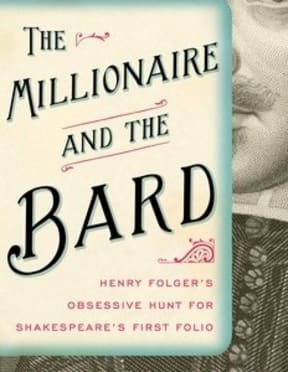
The Millionaire and the Bard Photo: Supplied
William Shakespeare left no manuscripts or copies of his work when he died in 1616. Seven years after his death, friends and fellow shareholders in the Globe Theatre put together a collection of 35 of his plays called the First Folio.
Professor Andrea Mays from California State University says that some of Shakespeare’s greatest plays might have been lost “on the ash heap of history if not for the First Folio publication”. 18 plays that had never been published were in the First Folio.
“We would have lost Henry the VIII, Cleopatra, Julius Cesar, Twelfth Night, Anthony and Cleopatra and more,” says Mays.
At the turn of 20th century Henry Clay Folger, who was President and Chairman of the Board of Standard Oil, spent his fortune collecting the few surviving First Folios, 82 in all. “9-5 he ran the biggest corporation in the world and after 5pm he went home and he and his wife looked at catalogs and looked at items for their collection,” says Andrea Mays who has written a book about Folger’s quest to collect the work of Shakespeare called The Millionaire and The Bard.
Folger was obsessive about collecting anything connected to Shakespeare and obsessive about keeping the collection a secret. “While his competitors Henry Huntington, J.P. Morgan and other industrialists were competing with him in the rare book market many took bows at the auctions and published articles about what they had in their collections. Henry Folger was obsessively secret about it,” according to Mays.
No one knew the extent of the collection until Folger’s death in 1936. During his life, Mays says he didn’t just collect the works of Shakespeare, he enjoyed them.
“He really read the plays and they spoke to him,” says Mays. “I think they were also very personal for him. Essentially Shakespeare characterizes bold 17th century and modern men. He teaches you about life and loyalty and disappointment and ambition and rivalry and all of those things spoke to Folger as a 19th and 20th century man.”
The collection is now available for scholars and Shakespeare’s fans to see at the Folger Library in Washington DC.
“By looking at and comparing these 82 copies of this hand printed book scholars were able to figure out how the printing process worked in 17th century England,” says Mays.

